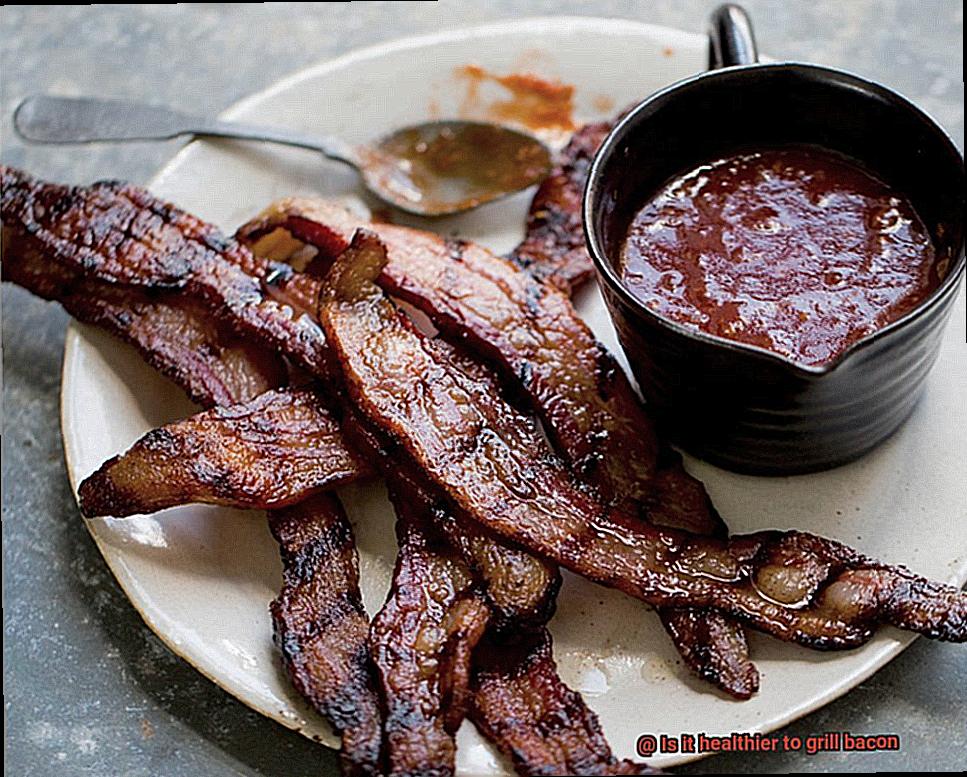Who doesn’t love bacon? Its salty, savory, and greasy goodness can make any breakfast feel like a feast. But let’s be real – we all know that bacon isn’t exactly the healthiest choice out there. With its high calorie, sodium, and fat content, it’s easy to see why some people are hesitant to indulge in this delicious treat.
Enter grilling. Many people believe that grilling bacon is a healthier alternative to frying or other cooking methods. And they might be onto something. Grilling allows excess fat to drip off the bacon, resulting in a crispier texture and fewer calories. Plus, you don’t need to use any extra oil or butter when grilling – which means less fat overall.
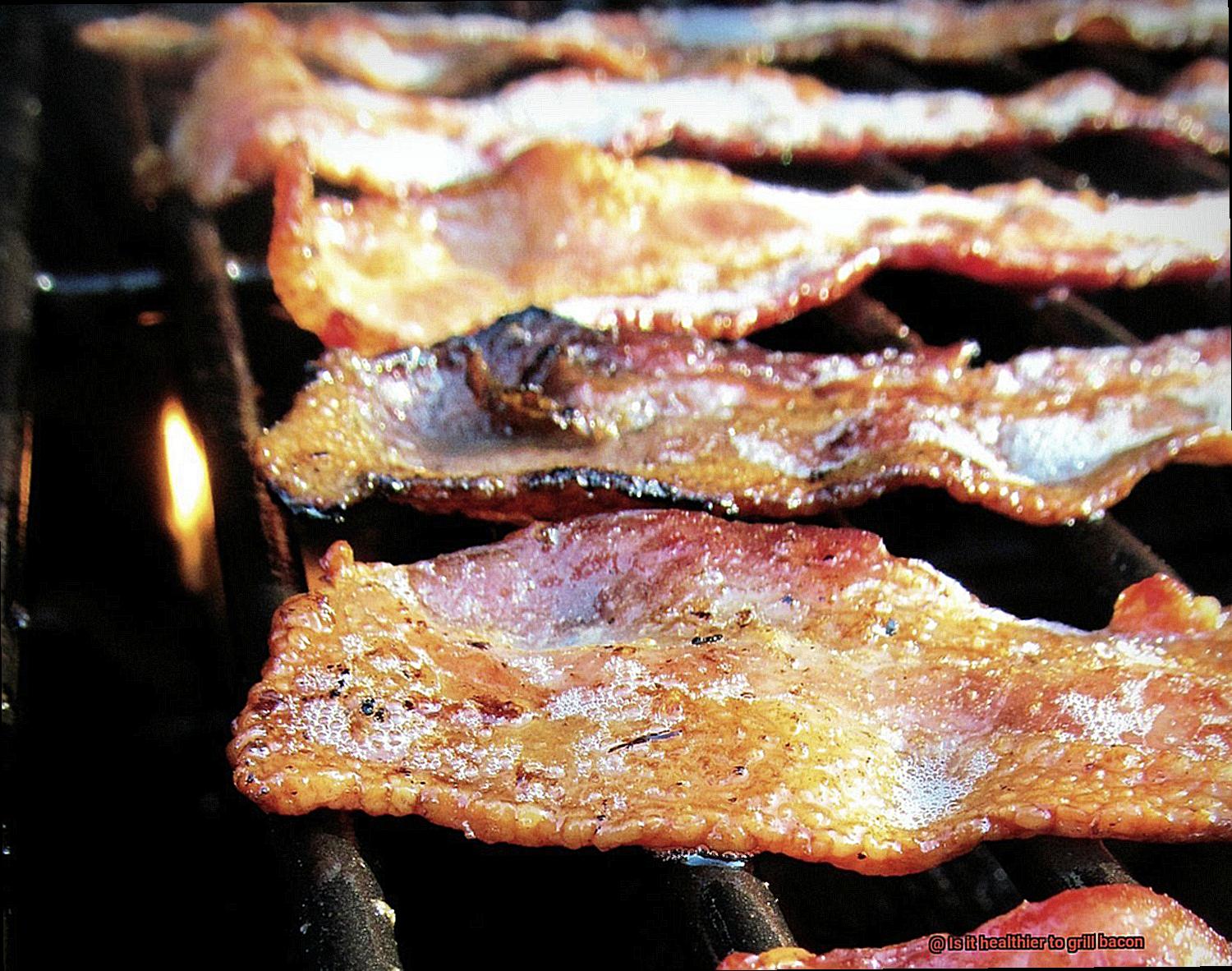
Of course, there are some concerns about the potential health risks of grilling meat. Some studies suggest that certain carcinogens can form when meat is cooked at high temperatures on a grill. But is this something we really need to worry about when it comes to grilled bacon?
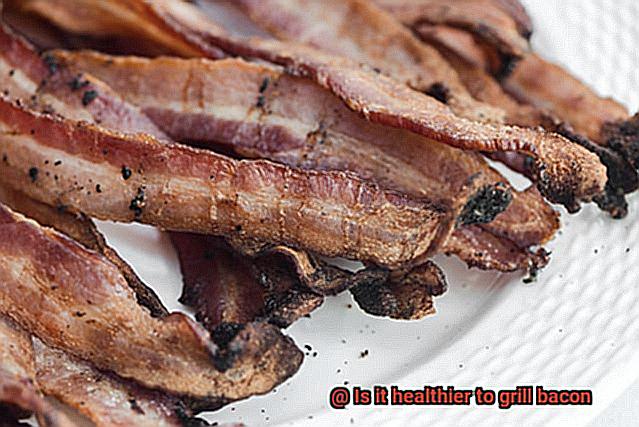
In this post, we’ll take a deep dive into the world of grilled bacon and explore its potential health benefits (and drawbacks). We’ll compare grilling to other cooking methods and offer tips for getting your bacon just right on the grill. Plus, we’ll share some mouth-watering recipes that will inspire you to get creative with your favorite breakfast food.
So whether you’re a die-hard bacon lover or someone who wants to enjoy this indulgence without feeling guilty, keep reading for everything you need to know about grilling bacon.
Contents
What is Bacon?
Bacon is a mouthwatering breakfast food that has captured the hearts and stomachs of people all over the world. This salty and savory delight is made from different cuts of pork such as belly, back, and shoulder, which are rubbed with a mixture of salt, sugar, and other seasonings before being left to rest for several days. The result is thin slices of cured pork that are typically cooked until crispy.
While bacon is undoubtedly delicious, it’s also a high-fat food that’s associated with negative health effects when consumed in excess. Each slice of bacon contains around 3 grams of fat along with protein, sodium, and other nutrients. Some studies have even linked bacon consumption to an increased risk of heart disease, diabetes, and certain types of cancer.
Despite these concerns, many people still enjoy bacon as a tasty treat. When it comes to grilling bacon specifically, there are some potential health benefits to consider. Grilling bacon can reduce the amount of fat that is absorbed during cooking, as the excess fat drips off the meat and into the grill. This can make grilled bacon a healthier option than pan-fried bacon.
However, before you start grilling up a storm, it’s important to note that cooking bacon at high temperatures can lead to the formation of harmful compounds called heterocyclic amines (HCAs) and polycyclic aromatic hydrocarbons (PAHs). These compounds are formed when meat is cooked at high temperatures and can increase the risk of cancer when consumed in large amounts.
To reduce the formation of HCAs and PAHs when grilling bacon, try cooking it at lower temperatures or marinating it in a mixture of vinegar and herbs beforehand. Additionally, choosing leaner cuts like turkey or Canadian bacon can be a healthier option as they have less fat and calories than traditional pork bacon.
Health Concerns of Bacon
Bacon has long been a breakfast staple and a beloved food for many. However, it’s important to consider the potential health concerns that come with consuming this delicious treat.
One of the primary health concerns associated with bacon is its high saturated fat content. This type of fat has been linked to heart disease and other health issues. While it’s okay to indulge in bacon on occasion, moderation is key.
But before you completely swear off bacon, it’s important to note that there are some potential health benefits as well. Bacon is an excellent source of protein and contains essential vitamins and minerals like vitamin B12, zinc, and selenium. These nutrients are crucial for maintaining good health and can help support a strong immune system.
Unfortunately, the curing process used to make bacon can also be a cause for concern. Nitrates and nitrites are often added to preserve the meat, but these chemicals have been linked to an increased risk of cancer. Additionally, cooking bacon at high temperatures can produce harmful compounds like PAHs and HCAs, which may also increase cancer risk.
So what can you do to enjoy bacon while minimizing the potential health risks? Here are some tips:
- Look for high-quality, nitrate-free bacon
- Cook bacon at lower temperatures to reduce the formation of harmful compounds
- Enjoy bacon in moderation as part of a balanced diet

Benefits of Grilling Bacon
Grilling your bacon is not only a healthier option, but it also adds a smoky flavor and crispy texture that will leave you wanting more.
Let’s explore the reasons why grilling your bacon is a smarter choice:
- Reduces Excess Fat: Grilling allows the excess fat in bacon to drip off, making it a lower-fat option than other cooking methods. This means you can indulge in the savory taste of bacon without consuming as much fat.
- Smoky Flavor: The Maillard reaction occurs when the amino acids and sugars in the bacon react to the high heat of the grill, creating a unique smoky flavor that’s hard to replicate with other cooking methods. If you’re looking for a bacon with an irresistible smoky flavor, grilling is the way to go.
- Crispy Texture: Grilling produces a crispy texture that many find irresistible. Unlike other cooking methods like frying or baking, grilling takes just a few minutes per side, making it an excellent option for busy mornings or quick meals.
- Healthier Ingredients: Many store-bought bacon products contain added nitrates and nitrites that have been linked to health problems like cancer. Grilling your own bacon at home gives you more control over the ingredients used and allows you to opt for nitrate-free options.
Risks of Grilling Bacon
As delicious as it may smell, grilling bacon comes with certain risks that should not be ignored.
One of the most significant risks of grilling bacon is the formation of harmful compounds known as polycyclic aromatic hydrocarbons (PAHs) and heterocyclic amines (HCAs). These compounds are formed when meat is exposed to high temperatures and have been linked to an increased risk of cancer. PAHs are produced when fat from the bacon drips onto open flames or hot coals, causing smoke to settle on the bacon. Meanwhile, HCAs are formed when amino acids, sugars, and creatine in the bacon react to high temperatures.
But that’s not all. Grilling bacon also poses a risk of flare-ups. These occur when fat from the bacon drips onto open flames or hot coals, causing sudden flames to shoot up. Not only can this burn your bacon, but it can also increase the risk of injury.
Lastly, grilling bacon can lead to higher levels of cholesterol and saturated fat. While some fat melts away during grilling, some remains on the meat, making it higher in calories and harmful fats.
So, what can you do to minimize these risks? Here are some tips:
- Use a lower heat setting when grilling your bacon to reduce the formation of harmful compounds
- Keep your grill clean and use a drip tray to avoid flare-ups
- Limit your consumption of grilled bacon to maintain a healthy diet
Tips for Grilling Bacon Safely
Grilling bacon is a popular outdoor cooking activity, but it’s important to keep safety in mind to avoid any accidents or injuries. Here are five sub-sections that detail essential safety tips to consider when grilling bacon.
Clean the Grill
Starting with a clean grill is crucial to prevent any flare-ups or accidents. Use a wire brush to scrub the grates before cooking and ensure that there are no leftover bits from previous meals. This will ensure that your bacon cooks evenly and prevent any potential hazards.
Use Low Heat
Bacon contains a lot of fat, which can cause flare-ups when exposed to high heat. It’s best to use a low heat setting to prevent any flare-ups and cook the bacon slowly and evenly. This will also allow you to monitor the cooking process and avoid any potential hazards.
Use a Drip Tray
Bacon produces a lot of grease when cooked, so it’s essential to use a drip tray to catch the excess grease. This will prevent any flare-ups and make cleanup easier. A drip pan underneath the bacon can help catch any grease drippings and prevent them from causing flare-ups or fires on the grill.
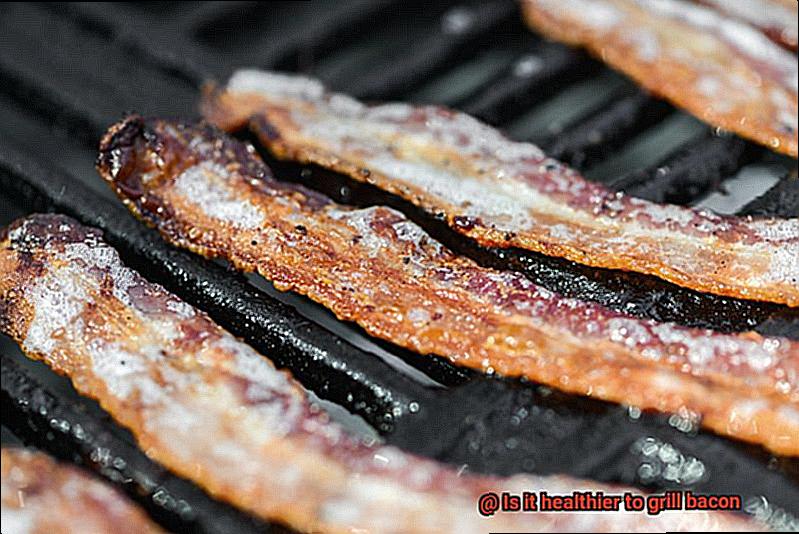
Monitor the Cooking Process
Keeping an eye on the bacon as it cooks is essential for preventing accidents or injuries. Be ready to move it away from any hot spots on the grill if necessary, as this will help prevent flare-ups and ensure that the bacon cooks evenly.
Use Tongs or a Spatula
When flipping the bacon, use tongs or a spatula instead of a fork. Forks can pierce the bacon, causing the grease to drip onto the flames and potentially cause a flare-up. Using long tongs or a spatula with a long handle can help prevent burns or accidents while flipping the bacon.
Choosing the Right Type of Bacon to Grill
If you’re planning to grill bacon, you need to know how to choose the right type of bacon for a perfect meal. As an experienced expert in this topic, I have some tips that will help you make the best decision.
Firstly, quality is paramount when choosing bacon. Look for all-natural or organic bacon that is free from antibiotics and hormones. This type of bacon has fewer additives and less fat, which makes it a healthier option. Its rich flavor will also add an extra dimension to your grilled bacon.
The cut of the bacon is another crucial factor to consider. Thick-cut bacon is ideal for grilling because it can withstand high heat and has a meaty texture. In contrast, thin-cut bacon tends to be fatty and can easily burn on the grill. Opting for thick-cut bacon also means you’re consuming less fat, making it a healthier choice.
Lastly, the curing process is an essential consideration. Bacon cured with nitrates and nitrites has been linked to health problems such as cancer. Choose nitrate-free or uncured varieties that are cured using natural methods like sea salt or celery juice instead.
Best Practices for Grilling Bacon
With a few best practices, you can achieve perfectly cooked, smoky, and crispy bacon that’s not only delicious but also healthier.
Firstly, make sure to choose the right type of bacon. Look for uncured or no nitrates added bacon, which eliminates potentially harmful additives. Thick-cut bacon is the ideal choice for grilling as it provides that perfect balance of crispy and chewy texture.
Once you’ve got your bacon, it’s time to fire up the grill. Maintaining a temperature of 325-350°F will ensure even cooking without burning the bacon. It’s essential to use a grilling basket or aluminum foil to prevent the bacon from falling through the grates.
While grilling, remember to keep a close eye on the bacon and flip it frequently to ensure it cooks evenly. Once it’s cooked to your liking, remove it from the grill and place it on a paper towel-lined plate to absorb excess grease.
To balance out the high-fat content of bacon, pair it with healthier side dishes like grilled vegetables or salad. This way, you can enjoy your favorite breakfast staple in moderation without feeling guilty.
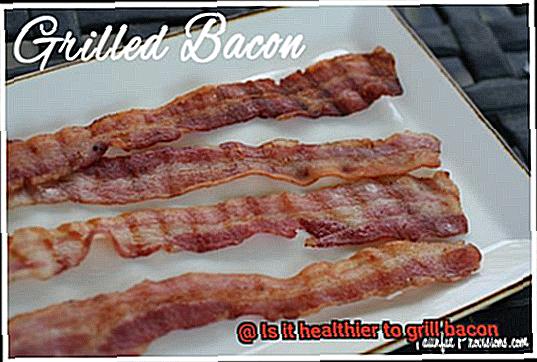
Alternatives to Grilling Bacon

It’s time to switch things up and explore some healthier alternatives to grilling bacon. As an expert in the field, let me share with you some of the best methods for cooking this beloved breakfast food.
First up, baking bacon in the oven. This method is simple yet effective. By placing the bacon on a baking sheet, you allow the fat to drip off and onto the pan, resulting in a crispier and less greasy bacon. Plus, it’s easy to clean up afterward. Make sure to keep an eye on it though – it can burn quickly.
Another option is pan-frying bacon on the stove. To reduce the amount of added fat, use a non-stick pan or add a small amount of water to the pan. This method may take longer than grilling, but it’s worth it for the delicious crispy result.
For those looking for something unique, air frying bacon has become increasingly popular in recent years. With an air fryer, you can cook bacon until crispy without any added oil or fat. It’s quick, easy, and produces a delicious result that will leave your taste buds wanting more.
Lastly, some people opt for microwaving bacon as a quick and easy option. While it may not result in the same crispy texture as other methods, it’s a great alternative for those short on time.
Ultimately, the healthiest way to cook bacon may depend on personal preference and dietary restrictions. However, exploring different cooking methods can provide a healthier alternative to grilling and add variety to your cooking routine. So why not try something new next time you cook up some bacon? Your taste buds (and your health) will thank you.
e7vItYzOS-Y” >
Conclusion
In conclusion, grilling bacon can be a healthier option compared to other cooking methods. The sizzling heat of the grill allows excess fat to drip off, resulting in a crispy texture and fewer calories. However, it’s important to take note that cooking bacon at high temperatures can lead to harmful compounds like HCAs and PAHs, which may increase the risk of cancer when consumed excessively.
To reduce these risks, try marinating the bacon beforehand or cooking it at lower temperatures. When choosing bacon for grilling, opt for all-natural or organic varieties that are free from antibiotics and hormones. Thick-cut bacon is perfect for grilling as it has a meaty texture and can withstand high heat. Avoid bacon cured with nitrates and nitrites as they have been linked to health issues such as cancer.
While grilling bacon comes with some risks, following best practices can help minimize them. Use a drip tray, maintain a lower heat setting, monitor the cooking process closely, and choose leaner cuts like turkey or Canadian bacon.
If you’re not keen on grilling your bacon, there are other options available such as baking in the oven or pan-frying on the stove. Air frying and microwaving are also becoming increasingly popular methods.
Ultimately, moderation is key when enjoying bacon as part of a balanced diet.

